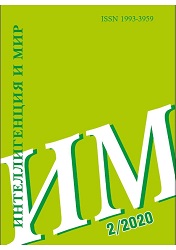Подготовка энергетических кадров в конце XIX в. — 40-х гг. XX в. — основа успешного функционирования электроэнергетики в период Великой Отечественной войны
The training of power engineering personnel in the late XIX — 40s of the XX century — the basis for the successful functioning of the electric power industry during the Great Patriotic War
Author(s): Tatiana Borisovna Kotlova, Galina Anatolyevna Budnik, Tatiana Valerievna KorolevaSubject(s): National Economy, Economic history, Environmental and Energy policy, Vocational Education, Higher Education , History of Education, 19th Century, Pre-WW I & WW I (1900 -1919), Interwar Period (1920 - 1939), WW II and following years (1940 - 1949), Human Resources in Economy
Published by: Ивановский государственный университет
Keywords: engineers; technicians; power engineering; higher educational institutions; Great Patriotic War; industrialization; the State electrification of Russia;
Summary/Abstract: The article summarizes material on the training of Russian engineers and technicians in higher and vocational secondary educational institutions from the end of the XIX century to 1945. The development of the domestic higher and vocational secondary education can be considered as a single process having certain stages of development. During the Great Patriotic War, engineers and technicians taught in educational institutions, and engineers worked in the power industry whose professional becoming was connected with the pre-revolutionary period of Russian history, as well as numerous specialists trained in the pre-war years. This problem is relevant, its research potential has not been exhausted, but scientific publications are not enough nationwide. The authors come to the conclusion that in the late XIX and early XX century in Russia the basis for the quality training of power engineers was laid largely contributing to the development of the electrical power industry. The Soviet government since its very establishment, in connection with the implementation of plans of the State electrification of Russia and the industrialization of the country, paid great attention to the organization of personnel for power plants. However, the quality of training specialists was rather low due to the implementation of the forced model of economic development, which in its turn negatively affected the quality of energy enterprises organization. A forced model of training engineers and technicians was used in 1941— 1942 in relation to the growth of energy capacities necessary for the work of defense industry. Since 1943, despite the difficulties of wartime, the government took measures to arrange the work of universities and technical school, to establish the living conditions of teachers and students. As a result, in 1941—1945, educational institutions trained engineers and technicians who organized an uninterrupted supply of electricity to the defense industry and population, thereby making a significant contribution to the Victory.
Journal: Интеллигенция и мир
- Issue Year: 2020
- Issue No: 2
- Page Range: 25-39
- Page Count: 15
- Language: Russian

